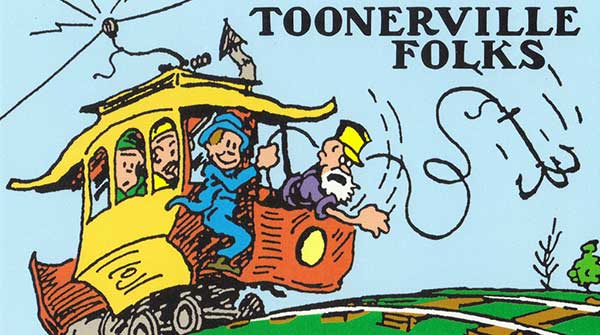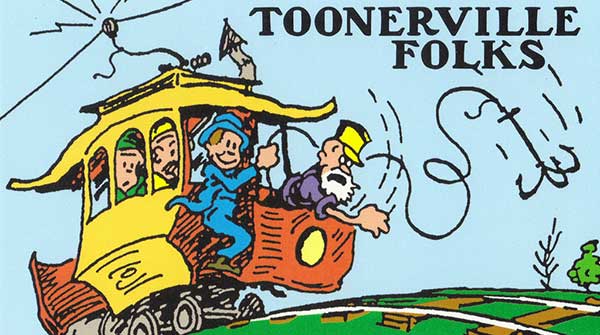The legendary comic strip Toonerville Folks ran from 1908 to 1955

I, like many Canadians, enjoyed celebrating the Family Day long weekend. It only seems appropriate that this week’s column delves into a mysterious tale of history, community and family.
Last month, I purchased a copy of Fontaine Fox’s Toonerville Trolley (1972). Compiled by literary agent Herb Galewitz and illustrator Don Winslow, it was the first proper collection of Fox’s legendary comic strip Toonerville Folks, which ran from 1908 to 1955.
This compilation is an exceptional volume of work. Some cartoons were photographed from the Lilly Library’s collection in Bloomington, Indiana. The balance was “assembled from those ‘zany, oddball’ collectors who have been clipping and saving newspaper cartoons since the days of Opper and Swinnerton.” The examples are lively, humorous, creative and not particularly politically correct.
 |
| Related Stories |
| Remembering the great comics of yesteryear
|
| Fritzi Ritz, the last flapper in the funnies, turns 100
|
| Stan Lee, left-wing culture warrior
|
The fictional community of Toonerville, which had a distinctive rural American flavour, was the focal point. The main characters included Mickey McGuire, Powerful Katrinka, Terrible Tempered Mr. Bang and Little Woo-Woo Wortle. There was also the old Skipper and his rickety little bag ‘o’ bolts trolley, affectionately known as the “Toonerville Trolley that met all the trains.”
Toonerville Folks was a huge success story. There were several books and an assortment of toys. Van Buren Studios created three memorable cartoons in 1926. There were 17 silent movies scripted by Fox for the Betzwood Film Company between 1920-1922, although only seven have survived. Mickey Rooney starred as Mickey McGuire in 55 comedy shorts between 1927-1936.
PBS also released a Toonerville Trolley cartoon in 1977, “Lost and Found,” as part of a Christmas collection, Simple Gifts. This delightful romp through history can be seen here.
Here’s where the mystery comes in.
The book contained a handwritten inscription, which read as follows:
Dearest Beims:
Here is a bit of Kentuckiana that I hope you will study with extreme care, and enjoy.
The Toonerville Trolley really was a Louisville Institution and Phenomenon when I was a small boy.
It ran all over including an area known as “Billygoat Hill” which was later dignified with the fancy name “Angora Heights.”
I carried a Paper Route in Shelbyville for the old Louisville Herald which was later smothered by the Courier-Journal – Mr. Fox’s Cartoons appeared daily and were easily the most popular cartoon feature of them’ time.’
Most (if not all) of these characters were suggested by local people – The “Terrible Tempered Mr Bang” was a local SOB well known to most everyone in Louisville.
Yours. Jim
Some of this fit with what I knew about Toonerville Folks. Other parts didn’t.
Fox was born near Louisville, Kentucky. He worked as a Louisville Herald reporter and occasional cartoonist. The strip’s inspiration partly came from his hometown.
Alas, the rest of Jim’s story is a bit faulty.
The Toonerville Trolley wasn’t necessarily a “Louisville Institution and Phenomenon.” There’s some dispute among comic historians as to its origins. “Various localities vied to lay claim to the ‘original’ Toonerville trolley,” Bill Blackbeard wrote in Maurice Horn’s The World Encyclopedia of Comics (1976), “and for decades every trolley line laid to rest across the country was called a ‘Toonerville’ by local news writers.”
There’s also Martin Sheridan’s analysis in Comics and their Creators (1944). He suggested the Brook Street trolley line in Louisville, which “used to furnish indifferent service at best,” left Fox and the Herald’s managing editor, A.T. McDonald, “equally disgusted.” McDonald reportedly “nominated Fox as a committee of one to draw some sketches illustrating how ridiculous the service was,” and he continued to write “critical and scathing editorials.”
Here’s the thing. Sheridan noted the Louisville-based trolley line “did not give immediate rise” to Fox’s comic strip. It happened several years later when he witnessed with his wife “a similar contrivance in the Pelhams of New York” of a “rattle trap of a street car.”
A July 30, 1937, New York Times article gives credence to the Pelham connection. “Back in 1909, when Mr. Fox took a ride on the Pelham line, then served by a rickety little car,” it noted, “he watched the ‘skipper’ gossip with the passengers and stop the car to pick apples for them; thus he drew his inspiration for his Toonerville Trolley comics.”
Meanwhile, Green’s Dictionary of Slang defined a billy-goat hill as “an area of town where a certain class of people live, usu. the poor, but occas. the better-off; note one such goat’s gulch in Kansas was gentrified and re-nicknamed Angora Heights.” This ties in with Jim’s description and would be linked with the Brook Street trolley line.
What about the “local people” serving as inspiration?
Sheridan suggested McGuire “had his prototype in Fox’s class in Louisville Public School,” and the Little Scorpions were based on “the boys Fox played with.” Other historians view it differently. “His subjects were local,” Colton Waugh wrote in The Comics (1947), and he “never lost that local flavour.” Nevertheless, “Toonerville is not particularly Kentucky, and there you have a great strip success recipe: something local, that can be true everywhere.”
Finally, there’s the mystery surrounding the well-known “local SOB’s” identity.
“Fox credited his own father as the prototype for the Terrible Tempered Mr. Bang,” according to Galewitz’s introduction. Mrs. Fox, however, “claimed that Fox himself was the original Mr. Bang” – and the cartoonist acknowledged using his fictional character “as an outlet for his pet peeves” in the comic strip.
Whoops! Maybe Jim should have read (and studied) the book more closely before he gave it to Beims.
Michael Taube, a Troy Media syndicated columnist and political commentator, was a speechwriter for former Prime Minister Stephen Harper. He holds a master’s degree in comparative politics from the London School of Economics.
For interview requests, click here.
The opinions expressed by our columnists and contributors are theirs alone and do not inherently or expressly reflect the views of our publication.
© Troy Media
Troy Media is an editorial content provider to media outlets and its own hosted community news outlets across Canada.

